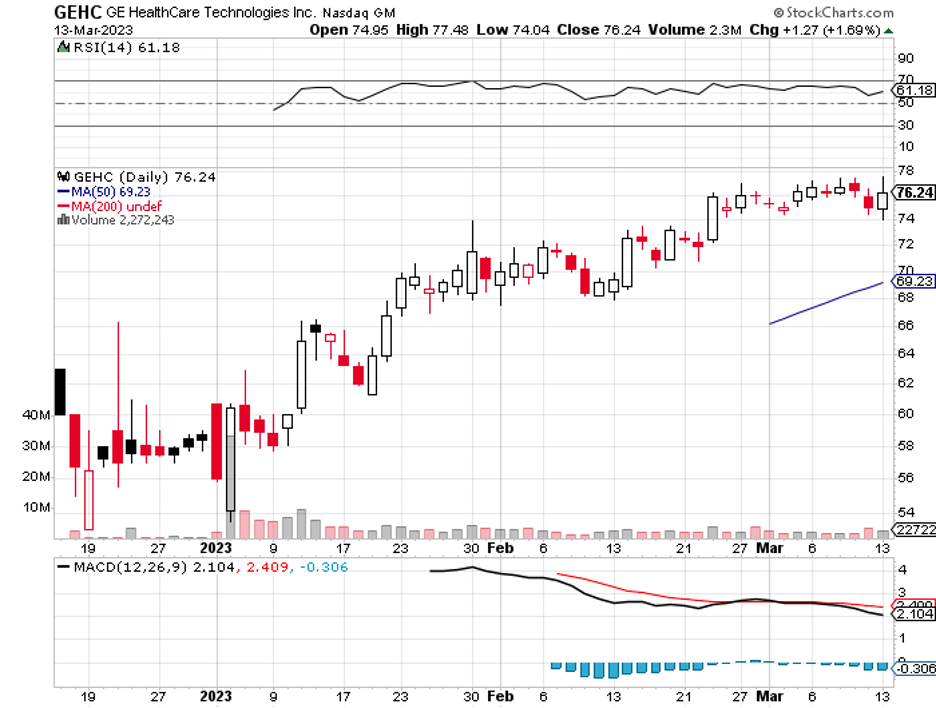A Market Leader Selling at a Discount
The spanking new multibillion-dollar healthcare spinoff from General Electric (GE) is gradually turning into a favorite in the industry.
The healthcare company, GE HealthCare (GEHC), was officially spun out of GE last January 4, but its shares began trading around mid-December. To date, GEHC is up about 30%. The stock has been trading for roughly 23 times its projected earnings in 2023.
While that value is already above the market multiple, GEHC is still anticipated to boost its earnings at an average of approximately 15% per year until 2026.
GEHC’s fourth-quarter earnings report was pretty solid. The company recorded $4.94 billion in revenue, rising by 8% year over year compared to the previous $4.59 billion. Most of the growth came from its imaging division, which climbed 11% from $2.44 billion to $2.71 billion thanks to the increasing demand.
For this year, GEHC is projected to generate over $19 billion in sales. This estimate is conservative since the company has yet to gain traction on Wall Street. Given its solid performance thus far, the company is expected to post a higher figure in the coming months.
Not much is known about GEHC yet. Aside from being an Illinois- based healthcare company focusing on medical technology, healthcare software and analytics, patient monitoring systems, and medical equipment maintenance and repair services, the spinoff only describes itself as “a leading global precision care innovator.”
That’s a relatively vague explanation that could cover much ground, but it appears to be focused on artificial intelligence (AI) in healthcare. After all, this is a lucrative and growing market that has sustained the ever-increasing demand.
Based on its records, GEHC generates the majority of its revenue from ultrasound and imaging services and products. These segments comprise about 75% of the company’s overall revenue. The rest are from various services, including clinical networking systems and financial solutions.
At the moment, more than 4 million of GEHC’s products are installed across the globe, lending support to over 2 billion patients since 2022.
Although this sounds less exciting than the other developments in the healthcare industry, the total addressable market for the medical imaging segment is impressively huge.
In 2021, this market was projected to reach $28 billion and will reach $47.4 billion by 2030. This represents a promising compounded annual growth rate of 4.9%. Critical to this growth and expansion is the climbing number of chronic diseases, which triggered earlier and more frequent checkups.
GEHC notably ensures that it sustains its momentum and gains a larger market share. The company has invested aggressively in research and development, allocating $2.7 billion to this effort alone from 2020 to 2022.
In February, the spinoff shelled out $3 billion to acquire Caption Health, a healthcare technology company developing AI software for medical imaging. The company's flagship product, Caption AI, is an FDA-approved medical imaging software that uses AI to guide healthcare professionals in acquiring and interpreting ultrasound images.
Basically, Caption AI is designed to help healthcare professionals who may need more specialized training in medical imaging, such as primary care physicians and nurses, to accurately and confidently perform and interpret ultrasound exams.
Apart from those, Caption Health's AI technology can assist in acquiring cardiac, lung, abdominal, and musculoskeletal images. It is intended to improve patient access to quality care by reducing the need for specialized medical personnel to conduct ultrasound exams.
By leveraging AI, these services could increase the speed and accuracy of diagnoses and treatment, ultimately improving patient outcomes. Needless to say, this deal significantly bolstered GEHC’s lineup and is expected to generate more than enough revenue to cover the price the company paid for the acquisition.
Despite its promising performance, GEHC remains under the radar and underappreciated. Comparing it to its peers, such as Mettler Toledo (MTD), Danaher (DHR), Boston Scientific (BSX), and Thermo Fisher (TMO), the company’s valuation looks discounted. Considering that it has the potential to become a long-term compounder, I suggest you buy the dip.





